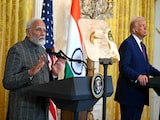- India criticised Pakistan at the UNHRC for persecuting minorities while lecturing on human rights
- India's diplomat Mohammed Hussain urged Pakistan to address minority persecution within its borders
- At least 23 civilians died in a Pakistani airstrike in Khyber Pakhtunkhwa province recently
India has slammed Pakistan's hypocrisy at the United Nations Human Rights Council (UNHRC), saying it is "deeply ironic" that a nation with a record of minority persecution can lecture others on human rights. Speaking at the 34th Meeting of the 60th Session of the UNHRC in Geneva on Wednesday, Indian diplomat Mohammed Hussain asked Islamabad to "confront the persecution of minorities on their own soil."
"India finds it deeply ironic that a country like Pakistan seeks to lecture others on human rights. Instead of spreading propaganda, Pakistan should confront the persecution of minorities on their own soil," Hussain said.
The remarks came days after at least 23 civilians - including women and children- were killed in Pakistan's Khyber Pakhtunkhwa province after the government in Islamabad decided to launch an airstrike on its own people. It underscored New Delhi's long-standing concerns about Islamabad's treatment of minorities and its consistent failure to address internal human rights challenges.
The session also saw other international voices raising concerns about the alarming human rights violations in Pakistan. Josh Bowes, an international geopolitical researcher, highlighted how Pakistan is at the 158th position on the World Press Freedom Index.
"The USCIRF Religious Freedom report for 2025 states that over 700 individuals were in prison for blasphemy charges, with a 300 per cent increase from the last year," he said, according to news agency ANI.
He further brought to light the atrocities being faced by the Baloch people and said, "The Baloch National Movement's Human Rights Body documented 785 enforced disappearances and 121 killings in the first half of 2025 alone. The Pashtun national jirga (assembly of Pashtun leaders) said that in 2025, 4000 Pashtuns are still missing".
Human rights activist Arif Aajakia also voiced concerns about the human rights situation in Pakistan. Referring to Pakistan, he alleged that Balochistan and Khyber Pakhtunkhwa provinces have been experiencing prolonged military operations. He claimed that cases of extrajudicial killings, enforced disappearances and torture have been reported, with families of missing persons frequently staging protests.















